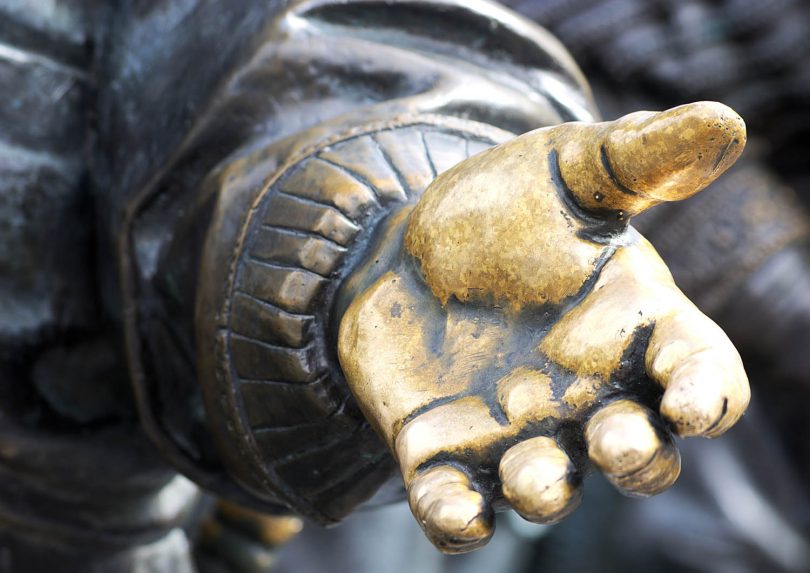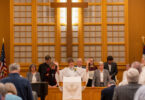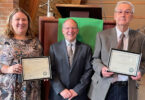Messages on Mark 10:35-45
Each week, Moravians across the U.S., Canada and the Caribbean share a common message through their Sunday bulletins.
This month, we share writings based on Mark 10:35-45. This Bible text is for “Proper 24” in Lectionary Cycle B of the Revised Common Lectionary used by the Moravian Church.
Mark 10:35-45 (New Revised Standard Version)
James and John, the sons of Zebedee, came forward to him and said to him, “Teacher, we want you to do for us whatever we ask of you.” And he said to them, “What is it you want me to do for you?” And they said to him, “Grant us to sit, one at your right hand and one at your left, in your glory.” But Jesus said to them, “You do not know what you are asking. Are you able to drink the cup that I drink, or be baptized with the baptism that I am baptized with?” They replied, “We are able.” Then Jesus said to them, “The cup that I drink you will drink; and with the baptism with which I am baptized, you will be baptized; but to sit at my right hand or at my left is not mine to grant, but it is for those for whom it has been prepared.”
When the ten heard this, they began to be angry with James and John. So Jesus called them and said to them, “You know that among the Gentiles those whom they recognize as their rulers lord it over them, and their great ones are tyrants over them. But it is not so among you; but whoever wishes to become great among you must be your servant, and whoever wishes to be first among you must be slave of all. For the Son of Man came not to be served but to serve, and to give his life a ransom for many.”
How May I Serve You?
Tracy Robinson, co-pastor, Esperanza for Bethlehem, Bethlehem, Pa. • October 21, 2018
These are the most essential words of a true believer.
A true servant’s heart is essential for ministry. A servant’s heart allows the person to put aside his or her own agenda in order to carry out Christ’s mission. The best leader in the church is the one who is willing to serve.
Jesus taught this not only to James and John but to the other ten disciples who were there listening: “You know that those who are regarded as rulers of the Gentiles lord it over them, and their high officials exercise authority over them. Not so with you. Instead, whoever wants to become great among you must be your servant, and whoever wants to be first must be slave of all” (Mark 10:42–44 NIV).
Jesus also called the whole church to do the same. As leaders in the Moravian Church, we are all called to serve first, but often we fail to heed our true calling: servanthood.
Beware! The barriers to evangelism in congregations are apathy, lack of concern, no sense of urgency, “do not see it as our responsibility,” the “what’s in it for me?” attitude.
Based on a relationship with the Servant Leader, Jesus Christ, a true servant puts aside his or her own agenda in order to carry out Christ’s mission.
The highest compliment a believer can give God is to invite a friend to know him.
Servant of All
G. Thomas Shelton, pastor, Friedberg Moravian Church, Winston-Salem, N.C. • October 23, 1994
The apostles James and John were confused about the servant nature of Jesus. They called him Master, Teacher and Lord, but they did not know what to make of him as Servant. On this side of the cross, resurrection, and ascension we cannot understand how the disciples could ask such a selfish question as we read in our text, Mark 10:35-45. However, before we are too hard on brothers James and John, let us examine our own attitudes as Christians about servant hood.
James and John said, “Grant us to sit, one at your right hand and one at your left, in your glory.” How often have we wanted the place of honor or hoped to grasp the place of power? How often have we been resentful of others who seem to have ascended to a “more important” position?
Jesus replied: “You do not know what you are asking. Are you able to drink the cup that I drink, or to be baptized with the baptism that I am baptized with?” The Master Servant was referring to his impending death. Then he told them: “If you want to be the greatest you must be a servant to all, and whoever would be first among you must be a slave.” This would be realized by serving each other, not as an earthly master over anyone, but as a volunteer serving freely. Service is not demanded but given. Jesus, as Paul said, “Emptied himself, taking the form of a slave…humbled himself and became obedient to the point of death, even death on a cross. Therefore, God…highly exalted him” (Philippians 2:7-9a).
A young person, asked to define humility, said, “It means low self-esteem.” The church needs to teach more clearly the beautiful truth that being servant to all is a great blessing and the way of the cross. As Jesus said, “The Son of Man came not to be served but to serve, and give his life a ransom for many.”
Maybe we should put over the front door of each church “Servants’ Entrance” and leave singing, “Go, Labor On; Spend and Be Spent.”
Upside-down Jesus
Carol Vogler, pastor, Rio Terrace Moravian Church, Edmonton, Alberta • October 18, 2009
Young Erik with Down Syndrome has recently embraced the concept of “upside-down.” Holding his stuffed teddy by one foot, he exclaims, “Look…bear…up-tide down…funny!” In fact, anything “up-tide” down prompts Erik’s infectious laughter, as “up-tide down” just doesn’t “fit” with the way he’s trying to understand the world.
So it was with the disciples. So it is with us, as we engage the “upside-down” reality of Jesus’ words, actions and being. What we see in Jesus, and hear in the words attributed to him, defies common understandings of power: “the Son of Man came not to be served but to serve.”
In Jesus’ time, social, political and religious power was understood and structured hierarchically: from the top down. This understanding and structure persists today. But time and again, in word and action, Jesus turns this understanding of power upside down. Washing the feet of his followers; touching those considered unclean; refusing to side with religious intolerance; speaking words of forgiveness, reconciliation and love—these characterize the way of Jesus and his call to newness of life.
Unfortunately for many who can’t grasp the concept, and for those of us who want to justify our vocation, our faith, our purchases, or our prejudices, the upside-down value system of Jesus/God is not at all amusing. Seeing Christ in others, serving others, and loving others as we have been loved is often too challenging to consider.
But when I look at Erik, I am grateful to the God who welcomes, embraces and includes Erik, and those others whom society has undervalued. And I smile, imagining how different, delightful, equitable this world would be, if structured according to the standards and call of love: the upside-down way of Jesus.
Be a miracle
John Wallace, pastor, Waconia Moravian Church, Waconia, Minnesota • October 22, 2006
We will do just about anything to keep one step ahead of our neighbor. We will scratch, crawl, whine, connive, weasel and maneuver our way to the top. We do not need to go to some remote jungle island to see this phenomenon unfold. In school, the church, the workplace, politics, people schmooze their way into a promotion, sweet talk their way out of trouble, or flirt their way to the top at the expense of those around them.
James and John in today’s Gospel are trying to scheme their way into choice seats in heaven. Jesus uses the moment to teach us what true greatness is. For Jesus, the social values of rank, what’s parked in the driveway, the clothes on your back are of little consequence. Jesus came to serve and not be served. Jesus takes what we conceive to be the most important values and flips them upside down.
Jesus reminds us that in the ordinary, everyday experiences of life we can encounter the extraordinary grace of God. Want to see a miracle? Be the miracle. Volunteer your time, talent, and treasure to serve at a local food shelf, teach a child to read, or consistently visit a person in hospice care. Be an advocate for affordable housing or attention to global warming. Serve on the local school board, lead a Bible study at church, deliver Meals on Wheels.
Jesus did not come to be served but to serve, and to give his life a ransom for many. In serving, we will experience the Almighty.

Images from Pixabay and Mike Riess, IBOC.







